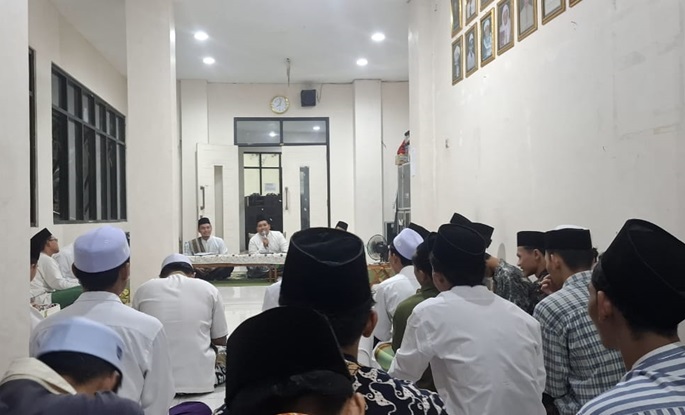Verse 55 of Surah al-Maidah is an important verse that is often discussed in interpretations, especially regarding the concepts of leadership and loyalty in Islam.
Your guardians are only Allah and His Messenger and the believers who offer prayers and pay zakat while bowing.
“Indeed, your only helper is Allah, His Messenger, and the believers who offer prayers and pay zakat while bowing.”
According to the majority of Ahlus Sunnah scholars, this verse explains the principle of leadership in the Muslim community in general, namely that a believer should make Allah, the Messenger and fellow believers who are devout as guardians, namely leaders, helpers and protectors. However, in the Shiite tradition, this verse is interpreted more specifically as an argument for spiritual and political legitimacy for Ali bin Abi Talib.
One of the prominent interpreters of Shiite nuanced interpretation is al-Fayḍ al-Kāsyānī, who in Tafsīr al-Ṣāfī provides in-depth interpretations based on the doctrine of the Imamate and the history of the Ahlul Bayt.

Short Biography and Thoughts of al-Fayḍ al-Kāsyānī
Al-Fayḍ al-Kāsyānī (d. 1091 AH/1680 AD), full name Mullā Muḥsin al-Fayḍ al-Kāsyānī, was a scholar, philosopher, hadith expert, and great interpreter from among the Shia Itsnā ‘Asyariyyah (Shia Twelve Imams). He was a student of Mulla Ṣadrā al-Syīrāzī, a figure in the philosophy of wisdom muta’āliyah and also has close thinking with theology Imamiyah which places the Imams as sources of divine truth after the Prophet Muhammad ﷺ.
In the field of interpretation, his famous work is Tafsīr al-Ṣāfīwhich is included in the bi al-ma’tsūr (history-based) style of interpretation, but with a strong emphasis on the narrations from the Ahlul Bait. Through this work, al-Kāsyānī attempted to unite tafsir, philosophy, and Sufism, while maintaining the authority of the Imams as guardians of the true meaning of the Qur’an.
Al-Kāsyānī’s thought emphasized that the Qur’an cannot be understood in its entirety without the guidance of the Ma’ṣūm Imams. He wrote that just as the Prophet was the translator of the first revelation, the Imams were the translators of subsequent revelations who maintained the purity of their meaning from deviation. In other words, the authority of interpretation for al-Kāsyānī is hierarchical and sacred, placing the Imam as the main link between humans and God.
However, this approach is often criticized by Ahlus Sunnah ulama because it is considered too exclusive and fanatical towards Ahlul Bait, thereby denying the authority of other ulama who also have scientific legitimacy in understanding the Qur’an.
Tafsir QS al-Maidah: 55 in Tafsīr al-Ṣāfī
According to al-Fayḍ al-Kāsyānī, this verse does not only talk about solidarity between believers, but also about the spiritual and political leadership of the people after the Prophet. He wrote that:
And those who believe” means Ali and his sons, the Imams until the Day of Judgment.
The meaning of وَالَّذِينَ ءَامَنُوا is Sayyidina Ali and the descendants of the Imams until the Day of Judgment. He explained that this verse was revealed regarding the incident of Ali bin Abi Talib who gave a ring to a beggar while bowing down in prayer. For al-Kāsyānī, this act was not just alms, but a spiritual symbol that Ali was the true wali (leader) of the people after the Prophet.
Next, in Tafsīr al-Ṣāfīal-Kāsyānī wrote that the word “saint” (your leader) includes three important dimensions, namely Wilāyah Ilāhiyyah, God’s leadership as a source of absolute power. Second, Nubuwwah Region, leadership of the Prophet as a messenger of revelation. Third, Imamate Region, leadership of the Imams as the spiritual successors of the Apostles. He emphasized that understanding the Qur’an without the guidance of the Imams would lose its true meaning, because the Imams are the guardians of the true interpretation of revelation.
This interpretation shows the typical Shiite view that the structure of religious authority must be hierarchical from Allah, Rasul, Imam. Thus, this verse is one of the strongest theological arguments for the concept of Imamah in the Shiite school of thought.
Interpretation Validity Analysis
According to Prof. Abd. Kholid, the validity of the interpretation of ‘aqīdī can be weighed from three main aspects: (1) hierarchy of interpretation, (2) suitability of language and Ulūm al-Qur’an, and (3) it is not a one-sided truth claim.
- Hierarchy of Interpretation
Al-Kāsyānī interpreted the Qur’an methodically al-Qur’an bi al-Qur’an And al-Qur’an bi al-ḥadīth. In the Tafsīr al-Ṣāfīmany refer to Shia hadith sources such as al-Kafī works of al-Kulainī and Tafsir al-Qummi. From the perspective of Shiite epistemology, this method is valid, because it relies on the history of the Ma’ṣūm Imams who are believed to be infallible (preserved from error). However, from the perspective of Ahlus Sunnah, this validity is not generally accepted because the sanads of these hadiths do not meet the criteria for validity in Sunni hadith science.
- Conformity with Language Rules and Ulūm al-Qur’an
From a linguistic perspective, al-Kāsyānī’s interpretation still maintains the original meaning of the verse. Say “governor” which means friend, helper, or leader, can indeed be interpreted as a form of authority. Phrase “wa hum raki’un” also corresponds literally, namely those who bow down in prayer. However, this interpretation then expands the linguistic meaning to historical and theological meaning, that the bowing occurred at the event of Ali’s almsgiving. From the perspective of interpretive science, this approach is still acceptable because it uses asbāb al-nuzūl to strengthen the explanation. However, its content is very ideological, because it shifts the general meaning to be exclusive to the Ahlul Bait.
- Not a one-sided truth claim
Tafsir al-Kāsyānī contains a strong interpretation of ‘aqidī in the internal truth claims of his school. It interprets this verse as an argument Priest Ali firmly. Even so, he still provides rational arguments and historical context that can be studied academically. Compared to the interpretation of Ahlus Sunnah (Ibn Kathīr, al-Ṭabarī, al-Qurṭubī) which interprets the verse in general as social loyalty between believers, al-Kāsyānī’s interpretation is more particular and ideological, but not completely closed to scientific dialogue.
Criticism of Tafsir al-Kāsyānī
Al-Kāsyānī’s interpretation shows a fanatical tendency towards the doctrine Priestto make every verse related to leadership always directed to the Ahlul Bait. Methodologically, this interpretation is very systematic and argumentative, but theologically it closes the scope for universal interpretation of the verse.
This approach risks separating the message of the Qur’an from its general context, because it makes loyalty to the Ahlul Bait the only valid meaning of the concept walāyah. Criticism by Sunni scholars states that this kind of interpretation is more apologetic than a scientific exposition of the meaning of the verse.
Conclusion
Tafsīr al-Ṣāfī The work of al-Fayḍ al-Kāsyānī is an important interpretation in the Shia treasures, especially in explaining the concept territory And Priest. Internally, this interpretation is valid within the Shia epistemological framework because it is based on the Ahlul Bait hadith and consistent language analysis. However, from a cross-school perspective, this interpretation needs to be criticized because it contains a theological bias and an exclusive tendency towards Ahlul Bait.
However, this work still has scientific value as a systematic representation of Shiite interpretive thought and as well as reflection material for Muslim readers to see how ideology can shape the style of interpretation of revelation.
Also read: Sunnis and Shiites, a glance at their background and differences
Author: Wahyu Nur Oktavia
Editor: Muh. Sutan
News
Berita
News Flash
Blog
Technology
Sports
Sport
Football
Tips
Finance
Berita Terkini
Berita Terbaru
Berita Kekinian
News
Berita Terkini
Olahraga
Pasang Internet Myrepublic
Jasa Import China
Jasa Import Door to Door



